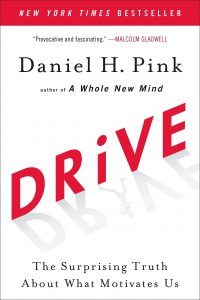 Drive: The Surprising Truth About What Motivates Us by Daniel Pink (buy it) was released nearly ten years ago in 2009. I first learned about it from educators on Twitter and it was one of my summer reads in 2015. If you want to know where I took what I learned from it back when it was fresh you can read about that here.
Drive: The Surprising Truth About What Motivates Us by Daniel Pink (buy it) was released nearly ten years ago in 2009. I first learned about it from educators on Twitter and it was one of my summer reads in 2015. If you want to know where I took what I learned from it back when it was fresh you can read about that here.
What I want to say today is, even though 2009 seems like one million years ago, Pink’s ideas are timeless, especially if you want to take either your own classes or your whole school on a student-led, student-centered journey (such as #20Time or #GeniusHour). It all depends upon your sphere of influence as we learned from Cohort 21’s F2F2.
I started with my own classes at American School Foundation of Monterrey with what I called Project AMP (yes, AMP is a dreaded acronym, read on). I now continue this work at Rosseau Lake College in our school-wide Discovery Days thanks in part to Cohort 21 facilitators @edaigle and @gvogt.
Key take aways still fresh in my mind to this day and without a re-read are the importance of autonomy, mastery, and purpose in the lives of everyone. Even if you are a first year teacher you have the ability to offer your students a lot of autonomy, and it would serve you well to consider Pink’s 4Ts: time, task, team, and technique. We should be encouraging our students and colleagues to strive for mastery at skills development as opposed to pursuing perfection. Perfection is toxic and a rather difficult place from which to fall should one ever achieve it.
Purpose is one of those things that seems obvious to well-established, mid-career adults, but is ever elusive to younger generations. Why do we do anything? Why are you reading this right now? Shouldn’t, “Hi, you’re a student in school right now and you are working towards eventual graduation” be enough? We all know that it’s often not. This is arguably one of the most difficult tasks of the teacher; to instill a sense of purpose in our learners if they don’t already have one of their own. I am still working on this too, but that’s a story for another day. Thanks for reading!
I think I’m going to have to add this book to my TBR pile, @lfarooq! I’ve always been so interested in the concept of achieving mastery rather than perfection. What does this look like in your day to day assessments of students? In Comm Tech, I had students demonstrate to me that they could do a particular skill – a live test, if you will. They were assessed as “achieved mastery”, “approaching mastery”, or “not yet mastered”. But where I struggled was with how to assign a traditional mark to that.
It’s funny you should ask, @jweening, it just so happens that I did something similar to a live test today, but in chemistry. They nearly all approached mastery, and the group that is not quite there yet will be by the end of tomorrow; they already double-checked with me and are aware that they made a calculation error. The language of approaching, meeting, exceeding (and does not yet meet) was paired with the word ‘expectations’ to represent Levels 2, 3, 4, and 1 respectively at my previous school. There are many ways in which teachers assign numeric grades to these categories, and as a person enamoured with statistics I can tell you that the more often you sample the closer you will get to the ‘central tendency of the data.’ In terms of what do I actually do; I most often give the top value of the range, but I know other teachers who give the median of the range, or use – / + to assign grades ending in 2, 5, and 8 respectively. Because everyone has their own methods and their own very great reasons for so doing, that sample rate and central tendency is what sees me through. Most recent and most representative values can also be employed. Rick Wormeli’s work (sample) is of specific interest here. Thanks for reading and replying.
This is still a very relevant book – one that I am seeing on some of my colleagues’ desks again too! You should check out our Cohort 21 alumni’s action plan on “Mastery” by Ed Hitchcock. He created an incredible action plan around mastery assessments.
Thanks,
Garth.